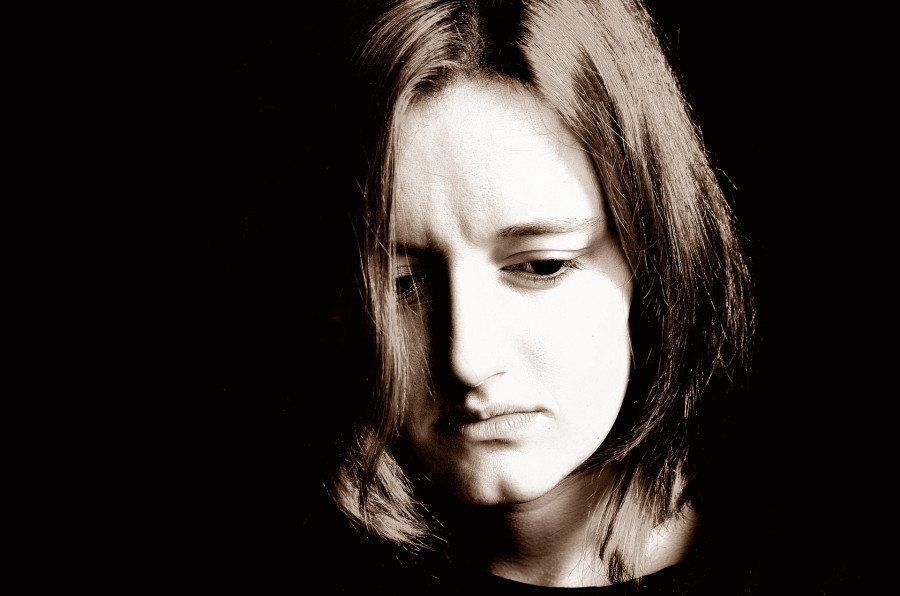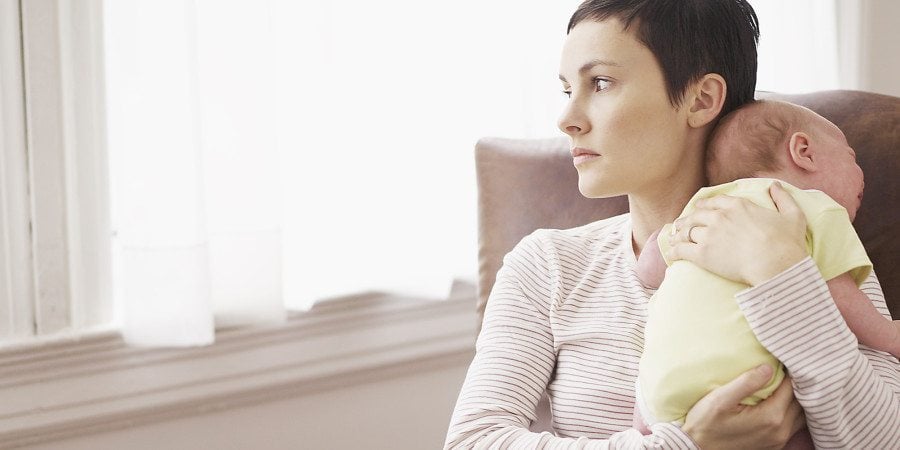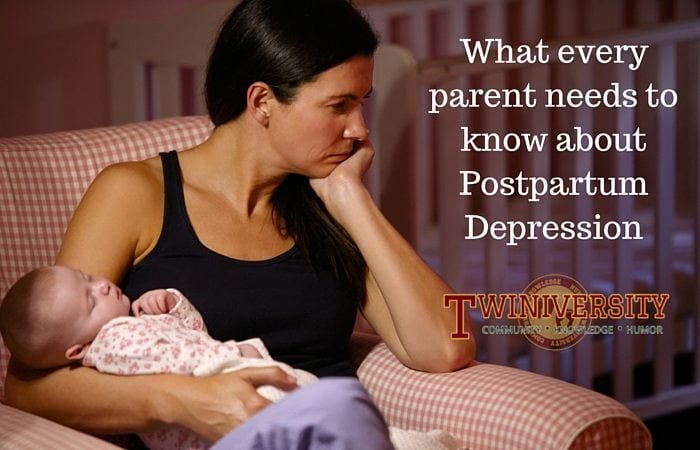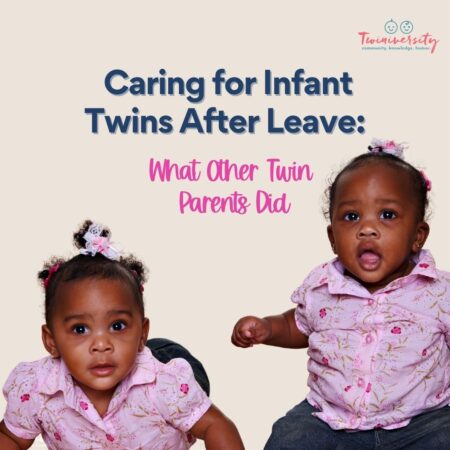Last updated on March 8th, 2024 at 09:21 am
Postpartum Depression is a very serious and horrible disease that we take VERY seriously at Twiniversity. Parents of multiples are even more at risk of postpartum depression (yes, even dads!) due to the stress that comes with managing two or more babies. We reached out to psychotherapist Jessica Wall for more insight on the signs of Postpartum Depression, the reasons why it happens, and how to get help. We hope that if you recognize yourself in this article that you get help IMMEDIATELY. Talk to your doctor, your spouse, and your loved ones to get the help that you need.
Tegan, a young, married woman, came to my office for a therapy session with her newborn daughter, filled with anxiety and worry in her eyes. She appeared exhausted, despondent, and far away. As we sat together like we had prior to her daughter’s birth, Tegan was not herself. She expressed grief and disconnection. I experienced Tegan as being in an unreachable state, distant from me and most importantly from her daughter. This was very disquieting.
During the session, Tegan did not observe her newborn once. She seemed to park her daughter in the room as if she were an inanimate object. I found myself checking on her daughter throughout the session. The infant clearly was cared for and healthy, but emotionally alone. Tegan was not connected to her daughter. She was suffering from postpartum depression (PPD).
Over many sessions, Tegan began to acknowledge overwhelming feelings of sadness and isolation. She related feeling as though there was a wall between herself and her newly formed family. She felt unengaged with her daughter and uncertain if she wanted to be a mother. These feelings were deeply connected to her own history of neglect by her mother and abandonment by her father.

As we began to understand the psychological issues impacting her postpartum depression we worked to find more support. We developed a treatment plan which included support at home, a parenting support group, continued individual psychotherapy sessions, couples work as needed, and medication evaluation and monitoring by a psychiatrist. In psychotherapy, Tegan focused on her family-of-origin and the tremendous unresolved feelings of loss and abandonment re-exposed with the birth of her daughter. Although this darkness pervaded for a significant time, it did lift. Help is available and effective.
In Tegan’s case, at first glance one might assume she was experiencing the Baby Blues. The Baby Blues is the consequence of varied hormonal and psychosocial shifts, and the tremendous demands placed on a Mother* soon after the delivery or adoption of a baby. This is a brief state of a week or two but not an illness. During this period, the Mother may experience quick shifts in her mood related to the stimuli around her. For example, a sentimental commercial on TV might bring on a host of tears that prior to having a baby would have little significance. During the Baby Blues, the Mother remains joyous about the birth of her child even if her moods vary. Tegan, on the other hand, did not feel connected, happy, or experience the joy of her daughter’s birth, becoming a Mother, or having a family. She entered a deep state of depression and anxiety, leaving her isolated, unable to engage in the world and with her family.
One in Ten New Mothers Endure Various Degrees of Postpartum Depression
Some women experience postpartum anxiety, panic disorder, or obsessive compulsive disorder. One in one thousand women suffer from postpartum psychosis. Postpartum complications can occur within days of the delivery or adoption of an infant, or appear gradually sometimes up to a year or more later. While the topic of Postpartum disorders is usually discussed about Mothers, many are surprised to learn Fathers are also susceptible, and experience these conditions at the same rate as mothers. As with Mothers, the symptoms can occur at any point from pregnancy to many months after the infant’s delivery or adoption.

Symptoms of Postpartum Depression (PPD), Can Include:
- loss of interest or pleasure in life
- loss of appetite
- decreased energy and motivation
- difficulty falling asleep or staying asleep
- early morning awakening
- sleeping more than usual
- increased crying
- feeling worthless
- hopeless or overly guilty
- restlessness
- irritability
- anxiety
- unexplained weight gain or weight loss
- thoughts of death
- worries about harming the baby or self
Anxiety Symptoms Can Include:
- palpitations
- pounding heart
- trembling or shaking
- nausea or stomach discomfort
- feeling dizzy or faint
- fear of losing control
- fear of dying
- chills or hot flashes
Symptoms of Psychosis Can Include:
- disorientation
- hallucinations
- delusions
- sleeplessness lasting for days
- loss of weight
- ideations of hurting self or other, including the baby
These symptoms are serious and potentially threatening to the life and well-being of the Mother and the infant if untreated.
If, as a new Mother, you experience the above symptoms and other unexplained distress, take these feelings seriously and get help. Reach out to your partner, family member, best friend, doctor, clergy… any important person in your life you trust to listen to you and assist in gaining the support necessary at this critical time. Along with securing personal support, if possible, it is essential to talk with a professional with expertise in postpartum disorders.

While the cause of Postpartum Disorders is not fully known, there appear to be a number of factors contributing:
- complications for the mother or infant during the pregnancy or delivery
- a prior history of depression or anxiety and/or a family history
- a history of early or recent pregnancy or child loss
- a change in one’s environment such as; a move, change in jobs, or divorce
- significant hormonal shifts as experienced with pregnancy and delivery
- or for no apparent reason at all!
As it takes a village to care for a child, the same is true for parents of infants, especially when suffering from a postpartum disorder. Although the path out of a postpartum disorder may seem dark, the result from obtaining support and treatment is one of greater connection and light for you and your family. As Tegan exemplified, she had lost her sense of connection and purpose and could not relate to her newborn daughter. With support and treatment, she regained her strength and connection to herself, family, and community, providing for a fortified future for her and her child.
*The term Mother is used throughout the piece for expediency; however Mother or Father can experience a Postpartum Disorder.
Jessica D. Wall, L.C.S.W. is a clinical social worker in private practice in Chicago and Oak Park, IL. A graduate from University of Chicago, the School of Social Service Administration, and is an advanced candidate in psychoanalysis at the Chicago Center for Psychoanalysis. Ms. Wall has experience working in community mental health, women’s inpatient unit, UIC Hospital, and currently in private practice working with children, adolescents and adults including couples.
Resources
Emergency Resource
- Emergency: 911
- Suicide Prevention Hotline: 1-800-273-TALK (8255)
Websites
- Massachusetts General Hospital Center for Women’s Mental Health, www.womensmentalhealth.org
- PPD Alliance of Illinois, www.PPDIL.org
- Postpartum Support International, www.postpartum.net
Books
- Down Came The Rain: My Journey Through Postpartum Depression, Brooke Shields
- This Isn’t What I Expected, Karen Kleinman, M.S.W. & Valerie Raskin, M.D.
- Postpartum Mood Disorders, Laura J. Miller, M.D.








